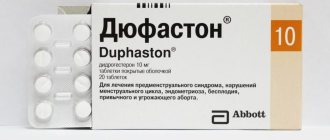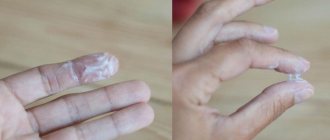Spotting after starting to take Jess: what is the reason
The hormonal contraceptive Jess is one of the most popular drugs of this type. The product has a direct effect on the functioning of the woman’s reproductive system. Therefore, the appearance of various non-standard discharges is possible.
When taking Jess, brown discharge is often the norm, but if it lasts for several weeks, its volume increases, it causes discomfort, it is necessary to look for the cause.
Reception features
Like other contraceptive medications, Jess protects against unwanted pregnancy. Studies have shown that this drug has the lowest Pearl index (an indicator indicating the occurrence of fertilization with regular use of the drug).
A special feature of the product is also its ability to influence the condition of the skin. The antiandrogenic effect of the drug reduces the likelihood of skin inflammation and acne due to the normalization of the cycle.
Contraindications for use are as follows:
- allergic reaction of the body against one of the components of the product;
- angina pectoris and the possibility of thrombosis;
- pathologies of the liver, kidneys, adrenal glands;
- neurological disorders;
- malignant tumors, including hormone-dependent ones;
- period of lactation and pregnancy.
There are two types of the drug - Jess Plus and Jess. In the first case, the product includes an additional calcium component, levomefolate (the active form of vitamin B9).
Typically, the drug is prescribed for contraception, but additional effects of the drug are also taken into account, which make it possible to prescribe it for the treatment of certain pathologies, such as:
- tendency to acne and excessive oily skin;
- swelling syndrome before the onset of menstruation;
- folate deficiency, especially before planning conception and/or IVF;
- severe stages of premenstrual syndrome.
The drug is a low-dose monophasic contraceptive. It can also be used in adolescents, subject to the onset of the first full menstruation (menarche). After starting to take the drug, there is an improvement in the condition of the skin of the face and head, and a decrease in the number of acne.
The effect of the drug on the female body
Almost all oral contraceptive drugs affect the functioning of the female body in one way or another. The mechanism of their work is to change the cycle, the quality of mucus and blocking possible fertilization.
With regular use of Jess, the cycle stabilizes, the functioning of the uterus and ovaries improves, the risk of iron deficiency anemia decreases, and the manifestation of premenstrual syndrome practically stops. However, to achieve these goals, it is necessary to follow the rules of application:
- maximum break in use is no more than 4 days;
- additional methods of contraception should be discontinued only 7 days after starting treatment.
The drug allows you to reduce the amount of male hormones and stabilize hormonal levels in general. Thanks to this, the strength of bones increases, the functioning of the nervous system, and the condition of the skin, hair, and nails improve.
Ethinyl estradiol in the drug is almost identical to the natural female hormone, so the drug is the most reliable and has the minimum number of side effects. In small doses, it affects the pituitary hormone, which is involved in follicle maturation. In this way, ovulation is completely suppressed, reducing the likelihood of pregnancy to zero.
Cycle alignment is observed no earlier than after 2 months of daily use of the drug. Normalization consists of reducing heavy discharge, disappearing pain during menstrual periods, reducing nervousness and aggressiveness before the onset of menstruation. In addition, the drug protects against iron deficiency and reduces the risk of developing cancer of the ovaries and uterus.
The effect of the drug on the psycho-emotional state of a woman was also noted. Suppression of ovulatory function and stabilization of hormonal levels lead to its normalization.
However, the drug still has side effects. Possible disruption of liver function, development of thrombosis, increased blood pressure, blood sugar, and the risk of breast tumors.
Advantages and advantages of Jess
The contraceptive has a number of advantages:
- elimination of pain before and during menstruation;
- Possibility of admission from 14 years of age;
- treatment of cosmetic skin defects;
- absence of discharge when taking Jess (possible in small quantities);
- stabilization of the cycle and hormonal levels;
- decrease in androgen levels in a woman’s blood;
- no risk of water retention and additional weight gain.
The drug has a high degree of reliability; the risk of unwanted conception is practically absent even if you skip a pill , if the next one is taken in a timely manner.
Jess Plus additionally contains active folic acid, which is necessary when discontinuing the drug and planning pregnancy, as well as to reduce the risk of developing anemia.
Discharge at different periods of the cycle
Bloody discharge is one of the most common side effects of taking a contraceptive, especially in women who regularly miss using the product or have just started taking Jess. Heavy or scanty bleeding can develop at any period of the cycle, has a thick consistency, dark brown color, and no odor.
Normally, such leucorrhoea can last a maximum of 3 months after starting to use the OC. At the end of this period, the nature of menstruation should normalize.
Beginning and middle of the cycle
Bleeding during the use of almost any contraceptives develops when natural hormones are replaced with synthetic analogues. Despite containing a small dose of the hormone, modern OCs can disrupt a woman’s natural hormonal balance and lead to the appearance of various spotting during any period of the cycle.
While taking Jess, discharge appears in the middle of the cycle and at the very beginning for the following reasons:
- Insufficient level of estrogen in the drug for the hormonal background of a particular woman. In this case, it is usually necessary to select a product with a stronger formula and a higher dose of estrogen.
- Lack of progestogen hormone. It can also be eliminated by changing the drug.
- Accelerated endometrial atrophy. During adaptation to hormonal fluctuations while taking Jess, the endometrium may peel off faster than before. The result is breakthrough bleeding, which can occur on almost any day of the cycle.
- Violation of the application regimen, missed doses, long breaks.
Bloody leucorrhoea does not affect the contraceptive activity of the drug, therefore, against the background of discharge, pregnancy does not occur with regular use. At the beginning and middle of the cycle, secretion is explained by hormonal changes in the female body.
Regular use of oral contraceptives seems to replace your own hormonal levels. In drugs, the amount of hormones is always lower than in the natural state, so the body gradually adjusts to reducing their dose. Most often this is manifested by various non-standard spotting discharges. Nausea and drowsiness may also occur.
At the end of the cycle
At the initial stage of the cycle, several phases are distinguished when one hormone is replaced by another. In the first period, estrogens predominate, preparing the endometrium for ovulation; in the second, an increase in the concentration of progesterone is observed.
Since Jess Plus and other OCs contain reduced doses of hormones, a woman may receive them in insufficient quantities and experience fluctuations in hormonal levels.
In the second phase of the cycle, before the onset of menstruation or 7–10 days before it, scanty brownish discharge may be observed as the body’s response to a lack of progesterone.
If the adaptation period, which is on average 3–6 months, has ended, but the discharge remains, it means that the concentration of gestagen or estrogen is increased.
This condition can also occur if you drink OK irregularly or skip it.
If you stop taking the drug during scanty discharge in the middle or final phase of the cycle, the bleeding may increase - up to iron deficiency anemia and fainting.
You should consult a doctor if the discharge is accompanied by weakness, an increase in volume, a change in color from brown to scarlet, the appearance of an unpleasant odor, or a general deterioration in health.
Any time during the cycle
Breakthrough, that is, spotting during any phase of the menstrual cycle, while taking OK Jess, more often occurs before the middle of the cycle or in other periods after starting to use a new package. This is especially common in women who are taking oral contraceptives for the first time.
The following metabolic factors may influence the occurrence of breakthrough bleeding:
- simultaneous use of other drugs;
- smoking;
- individual hormonal disorder.
In the absence of a diagnosed pathology and in the presence of spotting while using this OC, the doctor changes the dosage regimen: instead of 1 tablet, 2-3 tablets for 7 days. After this, you need to return to the recommended regimen - 1 active tablet per day.
Possible negative effects of Jess
The following side effects may occur with a fairly low frequency when taking the drug:
- Discomfort and breast engorgement during the first 90 days of use. This is caused by hormonal changes.
- The appearance of spotting and spotting is more common in the second phase of the cycle and several days before the expected regulation. They stop on average after 2-3 months, rarely lasting more than six months of regular use. If after 6 months the discharge continues, it is necessary to select a higher dosage drug.
- Fluctuations in body weight. There is still a widespread myth that oral contraceptives cause weight gain. However, low doses of hormones, as in Jess, do not lead to swelling and weight gain. Moreover, in some cases it is even possible to reduce it against the background of stabilization of the hormonal balance, if the problem was caused precisely by hormonal disorders.
- Blood clotting disorder. For women who have diagnosed pathologies of the hematopoietic system, the selection of oral contraceptives is carried out with special care after preliminary diagnosis, and monitoring is also carried out in the first few months of use.
- Breakthrough bleeding. Isolated cases of bleeding are associated with the fact that the uterus intensively rejects the endometrium, causing copious bleeding. This condition requires mandatory hospitalization and the use of hemostatic and other drugs. It is also necessary to replace the OK.
Stop taking it only on the advice of a doctor.
Jess and pregnancy
Pregnancy with proper use of OCs is almost impossible. However, there is a risk if there were omissions during the dose, reducing the dosage. On average, the reliability of the product is 98.5%; therefore, there is no 100% guarantee of non-conception. The reasons are as follows:
- Skipping a pill. Usually the drug is taken at the same time every day. But if the last tablet in the course (before the seven-day gap before taking a new package) is not taken, during this day the ovaries can begin to function as before. The same effect is observed if a woman does not take the first tablet from a new package after the end of menstruation.
- Digestive disorder accompanied by diarrhea and vomiting. Complete absorption of the active components of the drug occurs within 3–4 hours. If during this period even a single vomiting or severe diarrhea was observed, then most of the active substances can leave the body. The risk of fertilization increases.
- Concurrent use of medications. Antiallergenic, antibacterial, antifungal, and anticonvulsant medications affect the activity of hormones in the contraceptive. Diet pills also reduce the effectiveness of weight loss pills. Many natural ingredients, such as St. John's wort extract, have a similar effect.
- Fluctuations in the psycho-emotional background. Nervous overload, stress, and depression can negatively affect the absorption of the components of birth control pills, which can result in pregnancy.
- Cycle disruption. Women with amenorrhea, metrorrhagia, girls with no first menstruation while taking Jess may experience various side effects, including the onset of unwanted conception.
Pregnancy occurring while taking medications is normal. Timely cessation of OC use (usually immediately after a delay) allows the fetus to attach and develop. In the first 5 weeks, taking contraceptives does not affect the embryo, and only from the 6th week can it negatively affect the formation of the fetus.
When taking birth control pills, a delay in menstruation may occur, and this does not always indicate pregnancy. Therefore, we recommend that you study additional information on this topic.
Actions for bleeding
Opening bleeding requires calling an ambulance and hospitalization if:
- there is severe weakness up to the point of fainting;
- the blood has a bright scarlet hue;
- the discharge intensifies and has a liquid consistency;
- there is fever and chills.
If the discharge is scanty, a dose adjustment of the drug or the use of other drugs with a contraceptive effect is required.
If one or more tablets are missed, the next one should be taken as early as possible, and then continued according to the indicated regimen: one tablet per day at the same time every day.
Discharge due to the use of Jess and other OCs is a temporary phenomenon. They only indicate stabilization of a woman’s hormonal levels, are not considered a pathology, do not lead to the development of inflammatory processes, and do not affect reproductive capabilities and women’s health.
Source: https://TopGinekolog.ru/vydeleniya/korichnevye-pri-prieme-dzhes
Heavy bleeding
If, while taking birth control pills, heavy bleeding appears that is similar to menstrual bleeding, this indicates the occurrence of breakthrough bleeding. This is typical for the case when, after the influence of progesterone, the endometrium begins to be rejected, and the estrogen content in the OC taken is not enough to stop the resulting uterine bleeding.
In this case, you need to contact a specialist. But there may be situations when it is not possible to immediately see a gynecologist. Then doctors recommend taking a double daily dose of contraception (1 tablet in the morning and in the evening). It is necessary to drink the drug in this mode every day until the bleeding stops.
Later, it is important to visit a gynecologist so that he can find out why this situation arose. Afterwards he will recommend another drug. For example, if bleeding occurs while taking the microdose contraceptive Jess, the doctor will prescribe a low-dose OC (Yarina tablets or any other drug from this group).
Breakthrough bleeding can also occur in cases where:
- the regimen for using oral contraceptives is disrupted, i.e. the woman forgot to take the next pill;
- diarrhea or vomiting occurred, which worsened the absorption of the contraceptive;
- the woman is taking antibiotics or drugs that affect the functioning of the central nervous system;
- products containing St. John's wort are used;
- the contraceptive regimen is prolonged (in this case, OCs are taken for 63 days, followed by a break for 7 days, and then the pills are resumed).
Spotting in the middle of the cycle when taking Jess
Bleeding while taking birth control is not uncommon, Jess is no exception. Gynecologists prescribe the drug to women as contraception. It belongs to a group of hormonal oral medications that protect against unplanned pregnancy. Why does bleeding occur when taking Jess?
How can you explain the bleeding when taking Jess?
Jess contains ethinyl estradiol and drospirenone. The medicine has an antiandrogenic effect, that is, it lowers the level of male hormones and also reduces menstrual pain.
The drug is prescribed by a doctor according to a specific regimen, from which you cannot deviate. Unfortunately, Jess also has some unwanted effects.
Bloody discharge is a side effect of using this and other contraceptives. They usually have a spreading consistency and are typical in the first weeks after the start of use.
Normally, the discharge should disappear within the first three months of use; in rare cases, this period may extend to six months.
But there are patients whose bleeding does not stop even after adaptation to the medicine.
What is the reason for discharge on unusual days of the month?
The female menstrual cycle is a sequence of hormone fluctuations in the blood and female organs. In the first days of the cycle, a large amount of estrogen hormone is produced, culminating in ovulation. Then, if pregnancy does not occur, the amount of estrogen drops and the amount of progesterone increases.
Under the influence of progesterone, the endometrial layer is detached and menstruation begins. Menstrual bleeding is the secretion of the endometrial surface of the uterine layer.
The female body is designed in such a way that different hormones are produced at different stages of the cycle. And contraceptives contain very little hormones. The body does not have enough of this volume, and endometrial detachment begins before a certain period. It takes time for the female body to get used to such low levels of hormones.
What to do with bleeding?
If the discharge is from a spotting structure, subtle hygiene products can handle it, there is no cause for concern. The body will adapt after some time, and the bleeding will stop.
Such light discharge does not pose a health threat. Doctors usually observe the patient at the beginning of taking Jess. The discharge should gradually decrease in volume. The contraceptive effect is retained.
You need to take the pills strictly as prescribed by your gynecologist.
Sexual intercourse during bleeding.
Patients often ask doctors whether it is possible to have sexual intercourse with discharge?
Adaptive scanty bleeding does not exclude sexual intercourse. Blood can frighten a sexual partner; the woman should explain that this is a normal option.
The bleeding did not stop after the adaptation stage.
Several months passed and the bleeding still did not stop. How to be in this case?
- There is blood at the beginning and middle of the Jess pack. If the adaptation time has passed, and bleeding is still observed in the middle of the cycle, this means that the dose of estrogen is too small. It is worth consulting with a doctor who will select a drug with a higher concentration of the hormone.
- Discharge towards the end of the Jess pack indicates a small amount of the gestagen complex. The gynecologist will also select another remedy with a different gestagenic hormone.
- Heavy bleeding. Heavy bleeding is explained by rapid atrophy of the endometrial layer under the influence of progestogen substances in the drug, and there is too little estrogen to stop the bleeding. In the natural cycle, an increase in the amount of estrogen in the female body stops menstruation. When taking medications, this process does not occur as completely.
Other causes of heavy bleeding while using Jess:
- non-compliance with medical instructions when taking the drug (skipping a pill);
- vomiting, diarrhea (reduce the effect of the contraceptive);
- antibacterial drugs;
- herbal remedies, for example, St. John's wort decoction.
The female menstrual cycle is a sequence of hormone fluctuations in the blood and female organs. In the first days of the cycle, a large amount of estrogen hormone is produced, culminating in ovulation. Then, if pregnancy does not occur, the amount of estrogen drops and the amount of progesterone increases.
Spotting when taking Jess
Often, taking hormonal contraceptives is accompanied by noticeable changes in the general condition of a woman and the functioning of her reproductive system. Many women are concerned about the cause of discharge when taking Jess and the consequences of such secretion.
In this matter, it is important to pay attention not only to the secretion, but also to the drug itself.
The fact is that spotting is directly related to the effect of the oral contraceptive on the functioning of the reproductive system.
In most cases, there is no reason to worry, but it is useful for a woman taking such drugs to know what discharge and for what period is considered normal, and what indicates abnormalities.
How does the drug affect the body?
Jess is a monophasic oral contraceptive with androgenic properties. There is also Jess Plus, but its hormonal composition is no different from the first option. The main difference is the calcium content in the auxiliary tablet.
The active ingredients of OCs are ethinyl estradiol (a synthetic analogue of estrogen) and drospirenone (a synthetic progestogen). Together, these two components provide a contraceptive effect through their influence on the following areas of the reproductive system:
- Suppression of ovarian function, or rather suppression of ovulation, that is, preventing the release of an egg from the ovary.
- A change in the consistency of vaginal mucous secretions; they become thicker, thereby interfering with the penetration of sperm.
- Influence on the development of the endometrium, after which, as a result, the fertilized egg, if it has formed, cannot gain a foothold in the uterus.
All these factors are, in one way or another, related to menstruation and vaginal discharge. After all, if the mucous membrane of the uterus, endometrium and ovaries work differently, then the menstrual cycle cannot proceed without changes.
But here it is worth noting that not all discharge is considered normal. It is important to take into account their duration, accompanying symptoms, the patient’s age, as well as a history of gynecological diseases, if the woman had them.
As for the patients themselves, there is no need to be overly worried in situations where spotting occurs.
It is much more important to carefully monitor their frequency, character and your well-being while taking Jess, so that you can then tell all this information to your gynecologist.
Discharge at various periods of the cycle under the influence of Jess
Discharge that is brown, bloody, or other variations of secretion can help your gynecologist identify the problem in the body and prescribe appropriate treatment.
It often happens that the acceptable time for the body to adapt to an oral contraceptive has already passed, but the discharge still does not stop. Here, the period of activation of bloody vaginal secretion may indicate the predominance of one or another hormone in the female body.
In such a situation, the doctor, after examining the patient, can select a more suitable contraceptive option based on the symptoms.
Smudge instead of menstruation against the background of OK
At the end of the cycle after taking Jess, menstruation may not occur for some time. Often women observe blood on the pad, but it is not a result of the menstrual cycle.
Spotting instead of menstruation is considered normal when taking an oral contraceptive for no more than three months. As for the duration, pseudo-menstruation can last up to 14 days, but the discharge should not be heavy.
If bloody vaginal secretion begins to appear after the adaptation period (from 1 to 3 months), or its permissible period is violated (up to two weeks), then you must consult a doctor to determine the cause of this violation.
Heavy bleeding, which may not be systematic, is especially dangerous, so women rarely pay attention to them and associate them with menstruation.
Source: https://yurys.ru/zabolevaniya-detej/mazhushhie-vydeleniya-v-seredine-tsikla-pri-prieme-dzhes
Features of discharge when taking Jess and their main causes
Often, taking hormonal contraceptives is accompanied by noticeable changes in the general condition of a woman and the functioning of her reproductive system. Many women are concerned about the cause of discharge when taking Jess and the consequences of such secretion.
In this matter, it is important to pay attention not only to the secretion, but also to the drug itself.
The fact is that spotting is directly related to the effect of the oral contraceptive on the functioning of the reproductive system.
In most cases, there is no reason to worry, but it is useful for a woman taking such drugs to know what discharge and for what period is considered normal, and what indicates abnormalities.
Ways to avoid
You cannot risk your health and hope that taking hormonal contraceptives will not affect the female reproductive system.
Attention! Contraceptive drugs need to be selected correctly, taken according to the schedule and stopped correctly.
In order not to encounter the problem under discussion, stopping pills should follow the following rules:
- You should stop taking oral contraceptives after taking the last pill from the pack.
- Before deciding to cancel, you should consult your doctor.
- You may need to get your hormone levels tested.
Important! It is prohibited to stop taking contraceptives in the middle of the pack.
But in some cases, abruptly stopping taking medications is a vital necessity, for example, with:
- the onset of pregnancy,
- thrombosis,
- diagnosis of malignant neoplasms,
- liver pathologies,
- diabetes mellitus,
- more frequent attacks of hypertension.
In this case, stopping taking the pills should be done at any time, but under the close supervision of a doctor. It is important to understand that in this case withdrawal bleeding is inevitable.
The video explains the basic rules for taking birth control pills:
What kind of discharge can there be when taking Jess tablets?
"Jess" - oral contraceptives (OC) of the hormonal cycle. The use of birth control pills is often the only effective way to avoid unwanted pregnancy. Sometimes they are prescribed for therapeutic purposes and not at all voluntarily, but necessarily. Discharge is often observed when taking Jess.
Pharmacological properties
Discharge after taking a contraceptive is completely normal, but some of them indicate deviations in the woman’s health. A woman’s vagina constantly secretes a secretion, the composition of which can determine the health of the genitourinary system. It usually contains dead skin cells, bacteria, and mucus secreted in the fallopian tubes and vestibule of the vagina.
In a normal healthy state, the discharge has a yellowish tint and a neutral odor. The composition is dominated by lactobacilli, which produces lactic acid to combat irritants. Therefore, the appearance of brownish or bloody discharge is not normal before and after menstrual bleeding. But when affecting reproductive function, everything changes a little.
The product is produced in the form of tablets, packaged in a blister of 28 pcs.
, 24 of which are pink and contain ethinyl estradiol (0.02 mg) and the progestin drospirenone (3 mg), the remaining 4 white are placebo (do not contain active elements) and are intended simply to not go astray during the cycle. The drug "Jess Plus" in white tablets contains calcium, which is useful for both reproductive and other systems and organs.
Important! The package may contain one or three blisters. All pink tablets contain the same amount of active elements. The drug has analogues with a complete match in the concentration of active ingredients - “Jess Plus” (differs from “Jess” only by the presence of calcium in white tablets) and “Dimia”.
How do these drugs work? They immediately affect three main directions of the reproductive system.
- Prevents ovulation (prevents the egg from leaving the ovary).
- They change the composition of pre-vaginal secretion - they make it more viscous, which prevents the free movement of sperm.
- They change the functionality of the endometrium, which prevents the attachment of the fertilized egg.
In addition to the natural contraceptive effect, “Jess” has beneficial effects on the body:
- reducing skin oiliness, improving its quality, including acne treatment;
- maintaining normal water-salt balance;
- relieving pain and discomfort during menstruation.
Taking “Jess” is possible from the age of 14, including for the treatment of imperfections in a girl’s skin and normalization of the monthly cycle.
Instructions for use
How to start taking Jess? Doctors recommend that the first tablet coincide with the first day of menstrual bleeding, in which case the spotting during use may become less intense.
In case of changing any other similar product to “Jess”, if they contained 28 tablets, then on the day following the last tablet.
If 21 tablets - every other day or next Sunday, but in this case it is recommended to use additional means of protection for a week.
If you had an abortion (prescribed by a doctor or on your own initiative) or had a miscarriage, and now you want to start taking OK, then it is worth considering the period at which the procedure was performed.
If the abortion was completed before 12 weeks, then you should start taking it on the day of termination of pregnancy, do not be alarmed by brown discharge in this case - this is most likely the result of hormonal changes in the body.
If the termination of pregnancy occurred at a later date, then you should start taking it on the 21st or 28th day, plus a condom for the standard period, and if during the absence of OC you had sex without additional protection, then before you start using the product you should make sure that there are no fertilized cells.
Important! In case of switching from a functional method of contraception (vaginal ring, hormonal patch or intrauterine device), use must begin on the day the protection device is removed.
If you started taking Jess in the middle of the cycle, then you should use additional contraceptives during the first seven tablets of the course. After fertilization, it is recommended to start taking OK on the 21st or 28th day
Menstruation while taking Jess
The female body is very individual and it is impossible to predict 100% how it will react to hormonal drugs, but after finishing the pink pills there should be blood in the discharge. But during the first 1-2 months of taking it, there is a possibility that there will be disruptions in the cycle.
Discharge is directly related to the woman’s reproductive system and OCs also act exclusively on the reproductive system, which causes changes in its functioning and, consequently, discharge.
Sometimes spotting may begin in the middle of taking the blister pack. This is a common occurrence when taking Jess, but is completely harmless to a woman’s health.
If the discharge is profuse, accompanied by pain, or has an unusual color and/or smell, then you should immediately consult a doctor.
If after 1-2 courses of “Jess” the discharge does not stop, and a bloody or brownish secretion is released:
- in 2-3 weeks of use, this indicates a lack of estrogen;
- at week 4 - about a lack of gestagen.
In such cases, the doctor selects contraceptives individually.
If menstruation has not started, then it is necessary to remember all possible reductions in dosage (stomach upset, missing another pill, etc.)
), if such cases and unprotected sex occur after this, then immediately stop taking OK and consult a gynecologist or just do a test, you need to understand whether you are in a position.
If you are absolutely sure that no deviations were observed, then feel free to start a new blister, but if, after finishing the second blister, blood has not been added to the discharge, then stop taking it until you check with a gynecologist for pregnancy.
Skipping pills
Skipping is not taking a pill more than 36 hours after taking the previous one, taken on time. If you forget to take the white pill, just throw it away to stay on track.
If you miss the pink pill from the first week of taking it, you just need to take it; from the second week, take it and use a condom for a week. If the tablet was intended for the third week, then it is recommended to throw away this blister and start another without interruption.
We repeat, you can skip and even deliberately not drink white pills. If you miss two tablets in the first half of the course, you need to take them two days before with the next ones and then use contraceptives for 7 days.
If this happens in the second half, throw away the blister and start a new one.
If you miss pills after 3-4 weeks of taking them, your period may not come, but most likely a slight spotting will begin. This is completely normal in such a situation with a failure in the course of taking OK. At any point in doubt when taking it, use additional contraceptives to ensure that you avoid unwanted pregnancy.










